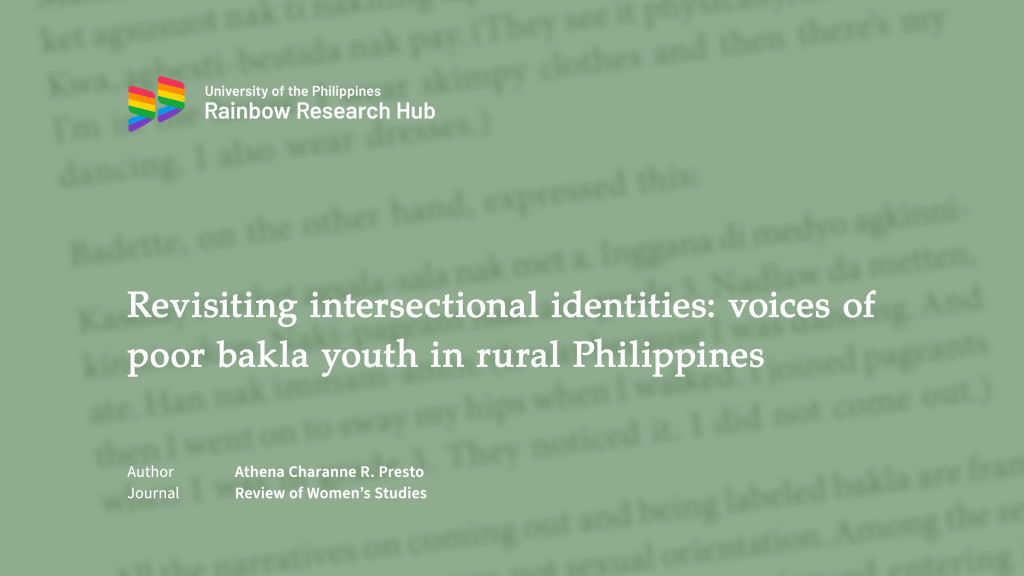
Essence
In this article, Ash explores the lives of poor bakla youth in a rural area. Stories of the poor bakla youth highlight unique experiences such as not having the need to come out, as well commonly shared encounters of discrimination by a macho figure.
The current study demonstrates how to effectively use a framework—in this case, intersectionality—to conceptualize and design a line of research.
Author: Athena Charanne R. Presto
Journal: Review of Women’s Studies
Citation: Presto, A. C. R. (2020). Revisiting intersectional identities: Voices of poor bakla youth in rural Philippines. Review of Women’s Studies, 29(2): 113–146.
Explore
Express
- What was the study’s objective?
- What research question/s did the study aim to answer?
- What framework/s did the study use? Explain it briefly.
- What was/were the study’s data collection method/s?
- What was/were the study’s data analysis method/s?
- How did the study take into account its unique population of interest (that is, poor bakla youth) into the research process?
- What are the study’s design/methodological strengths?
- What are the study’s design/methodological weaknesses or points of improvement?
Engage
[Individual/group activity]
Answer the following questions:
- The concept of intersectionality takes center stage in this study. Why do you think the study’s researcher used this as their framework? What makes intersectionality a relevant and valuable idea to people doing LGBTQI research?
- The researcher mentions that because they also spoke the same language used by their participants, they did not need a translator. How might having a translator impact data collection (and perhaps other stages of the research process)? How do you think researchers who need translators should address these effects?
- The participants in the study identify as bakla; however, the researcher labels some of them as transgender and asexual, given their experiences. This exemplifies a unique reality of doing LGBTQI research in the Philippines, that Filipinos conceptualize and understand issues of sex, gender, and sexuality differently from those from the West. How do you think researchers should deal with this challenge, particularly in the context of identity labels?
- The study’s researcher aims to share the results of the current study to stakeholders such as “institutions, policy-makers, non-governmental organizations.” If you are this study’s researcher, to which specific stakeholders would you disseminate the results to and why?
[Individual activity]
The study’s researcher briefly discusses their positionality, in that their being a cisgender woman can affect the research. Write an essay in response to this prompt: How do you think your SOGIESC and other aspects of your background and upbringing would impact the research process, your findings, etc.? Contextualize your insights as if you were to conduct a study on the same topic—on poor bakla youth in a rural Filipino barangay.
[Individual activity]
Practice writing a positionality statement for a qualitative research on the topic of poor bakla youth in a rural Filipino barangay.
